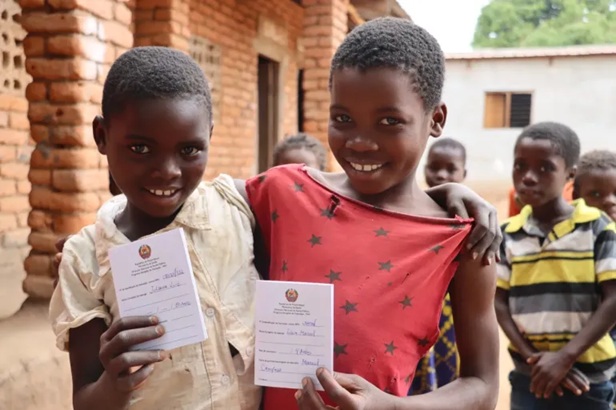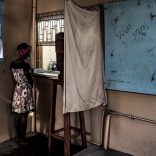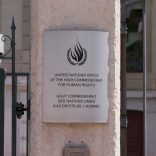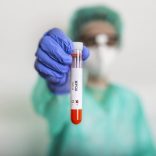Suspected poisoning of journalist Selma Inocência must be investigated - Amnesty International | ...
Gavi, WHO, and UNICEF strengthen commitment to cervical cancer prevention in Mozambique, protecting nearly 3 million girls

Image: UNICEF Moçambique/2025/Francelino Murela
The Government of Mozambique, in collaboration with Alliance partners Gavi, the Vaccine Alliance (Gavi), the United Nations Children’s Fund (UNICEF), and the World Health Organization (WHO), has reached a significant milestone in cervical cancer prevention, offering girls critical protection against the human papillomavirus (HPV) to adolescent girls aged 12–18 years old across all 11 provinces in the country.
This achievement builds on the introduction of the HPV vaccine into Mozambique’s national immunisation programme in 2019, and reflects the continued commitment of the Alliance partners and the Government of Mozambique to ensure access to essential health services for girls and women in the country.
“With just one dose, the HPV vaccine offers strong protection against cervical cancer – a leading yet preventable cause of death among women worldwide,” said Thierry Vincent, Senior Country Manager of Mozambique at Gavi. “In Mozambique, over 2.9 million girls have now joined a growing global effort to shift the trajectory of this devastating disease, reflecting a broader push by Gavi to protect lives in countries facing the heaviest cervical cancer burden.”
Globally, there are approximately 660,000 new cervical cancer cases and 350,000 deaths among women each year, making it the fourth most common cancer in women. About 85% of these cases and deaths occur in developing countries. In Mozambique, it is the leading cancer affecting women of reproductive age, claiming the lives of an estimated 4,000 women each year.
“No girl should lose her future because of a preventable disease. This vaccine represents our commitment to the health of our girls, so that none are left behind. By ensuring access to immunization, we reaffirm our responsibility to protect, educate, and promote opportunities for all children and secure the future of the next generations,” said Mary Louise Eagleton, UNICEF Representative in Mozambique.
The success of the vaccination roll-out, which reached 95% of its target, will help reduce the incidence of cervical cancer – by immunizing millions of adolescents, the country is easing the burden of disease on Mozambican families and the national health system, moving toward a healthier future free from preventable illnesses.
“HPV vaccination and cervical cancer prevention are, above all, public health priorities,” said Dr. Severin von Xylander, WHO Representative in Mozambique. “Starting early means offering all girls in Mozambique protection before they are at risk, which is vital for saving lives. In a region where many women are diagnosed too late, expanding HPV vaccination shows foresight and commitment from Mozambican leadership.”
This collaborative effort demonstrates that together, it is possible to transform lives and promote sustainable development by protecting future generations in Mozambique from cervical cancer.
About Gavi, the Vaccine Alliance
Gavi, the Vaccine Alliance is a public-private partnership that helps vaccinate more than half the world’s children against some of the world’s deadliest diseases. The Vaccine Alliance brings together developing country and donor governments, the World Health Organization, UNICEF, the World Bank, the vaccine industry, technical agencies, civil society, the Gates Foundation and other private sector partners. View the full list of donor governments and other leading organisations that fund Gavi’s work here.
Since its inception in 2000, Gavi has helped to immunise a whole generation – over 1.2 billion children – and prevented more than 20.6 million future deaths, helping to halve child mortality in 78 lower‑income countries. Gavi also plays a key role in improving global health security by supporting health systems as well as funding global stockpiles for Ebola, cholera, meningococcal and yellow fever vaccines. After two decades of progress, Gavi is now focused on protecting the next generation, above all the zero-dose children who have not received even a single vaccine shot. The Vaccine Alliance employs innovative finance and the latest technology – from drones to biometrics – to save lives, prevent outbreaks before they can spread and help countries on the road to self-sufficiency. Learn more at www.gavi.org and connect with us on Bluesky, Facebook, Instagram, LinkedIn, TikTok, X and YouTube.
About UNICEF
UNICEF works in some of the world’s toughest places, to reach the world’s most disadvantaged children. Across 190 countries and territories, we work for every child, everywhere, to build a better world for everyone. For more information about UNICEF and its work for children, visit www.unicef.org/bangladesh/
Follow UNICEF on Twitter, Facebook, Instagram and YouTube
About WHO
The World Health Organization (WHO) is the leading agency on international health within the United Nations system. Founded in 1948, its mission is to promote health, keep the world safe, and serve the vulnerable, ensuring that everyone, everywhere, has the opportunity to live a healthy life. In Mozambique, where WHO has been present since 1975, the Organization has supported the Government with technical and financial assistance to strengthen the health system. In 2025, we proudly celebrate 50 years of WHO’s presence in the country — five decades of partnership and progress towards improving the health and well-being of the Mozambican population.
For more information about WHO and its work, WCO Website, Facebook, X WHO Mozambique.












Leave a Reply
Be the First to Comment!
You must be logged in to post a comment.
You must be logged in to post a comment.